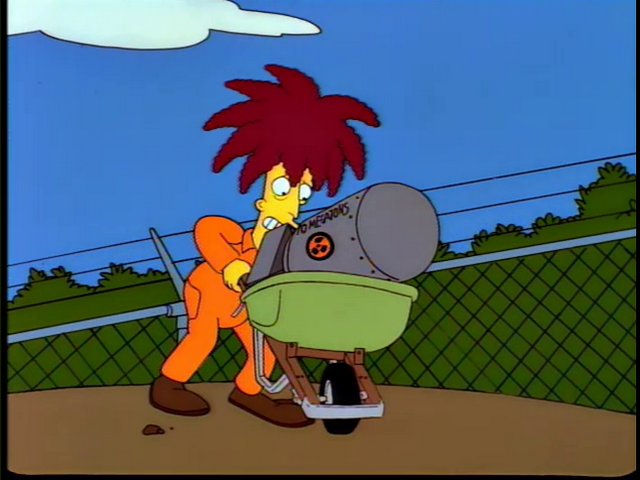Spike Spiegel
Member

http://www.commandandcontrolfilm.com/
Watch online HERE
Youtube Clips:
Promo (0:30)
Clip: PTS Team (1:38)
Clip: A Monster Waiting to Go Off (1:04)
BTS: Scene Breakdown (3:26)
Watching this on PBS right now and it is scary as hell so far. O_OA chilling nightmare plays out at a Titan II missile complex in Arkansas in September, 1980. A worker accidentally drops a socket, puncturing the fuel tank of an intercontinental ballistic missile carrying the most powerful nuclear warhead in our arsenal, an incident which ignites a series of feverish efforts to avoid a deadly disaster. Directed by Robert Kenner (FOOD, INC.) and based on the critically acclaimed book by Eric Schlosser (FAST FOOD NATION), COMMAND AND CONTROL is a minute-by-minute account of this long-hidden story. Putting a camera where there was no camera that night, Kenner brings this nonfiction thriller to life with stunning original footage shot in a decommissioned Titan II missile silo. Eyewitness accounts — from the man who dropped the socket, to the man who designed the warhead, to the Secretary of Defense— chronicle nine hours of terror that prevented an explosion 600 times more powerful than Hiroshima.
EDIT: Salon: The Night We Almost Lost Arkansas - A 1980 Nuclear Armageddon That Almost Was
On a September night 36 years ago, we nearly lost Arkansas. Some people may regard that as a mixed blessing, even now — Bill Clinton and his wife, then the governor and first lady of that state, were less than 50 miles away in Little Rock, at the Arkansas Democratic Convention.
If the Titan 2 intercontinental ballistic missile, or ICBM, that exploded inside its silo in Damascus, Arkansas, had detonated its nuclear warhead, both the Clintons and Vice President Walter Mondale (also attending the convention) would have been dead within minutes. So would have millions of other people in Arkansas and neighboring states, with a plume of deadly radioactive fallout extending from the mid-South to the East Coast, perhaps as far as Washington.
It's not entirely fair to say that the near-catastrophe of 1980 was covered up. But Americans were not even remotely told the truth about how close we came to nuclear Armageddon in the heartland. In fact, when Mondale demanded to know whether the Damascus missile was armed with a nuclear warhead, the military initially refused to tell him. ”In my book, I have a quote from someone who was in the room," said author Eric Schlosser during a recent video interview in Salon's New York office. ”Mondale said, ‘Goddamn it, I'm the vice president of the United States! You should be able to tell me if there's a nuclear warhead on this missile or not. Eventually they did."
Schlosser's book is called ”Command and Control," and is also the basis for a thriller-style documentary of the same title from ”Food, Inc." director Robert Kenner, who joined Schlosser for our conversation. As Schlosser explained, local and national news covered the Damascus accident for two or three days but without understanding quite how bad it was.
”It was one of the first stories covered by the new network called CNN," he said. Then it quickly faded from view. ”There was a presidential election going on," Schlosser continued. ”Jimmy Carter was running against Ronald Reagan. We had hostages in Iran — that was a daily news story."
Schlosser added, ”Most importantly, the Pentagon denied that there was any possibility that this warhead could have detonated and that was accepted by the media. It wasn't until I really started researching this accident that I was able to do interviews and obtain documents that showed conclusively that this warhead was at risk of detonating accidentally."
In the film, which opens in New York this week, Kenner interviews a former military contractor who designed the safety mechanisms on the Titan 2, the most powerful nuclear missile ever deployed by the United States. ”I started to ask him whether the warhead really could have gone off because of this accident," Kenner told me. ”He interrupted me before I could finish the question. ‘Yes,' he told me. ‘It absolutely could have.'"
How close did a simple maintenance mishap come to rendering at least one American state uninhabitable and killing an unknown number of people? And what does that tell us about the security and safety of the deadliest weapons ever built in human history? We don't know the answer to the first question, and the second one raises extremely troubling issues.


